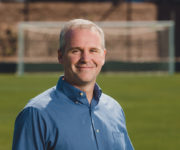Meet the Match
A Leader for Blind Soccer in Egypt
Since he was a boy growing up in Cairo, Ali Abou El Nasr’s life has revolved around soccer. Before he was a player, coach, and advocate, his passion was nurtured watching the best teams in Europe play on television. His favorite was Arsenal, one of England’s most successful soccer clubs.
“When I was 8 years old, my dad bought me my first Arsenal jersey as a gift,” Ali recalls. “You could say that jersey pre-determined my future.”
Although soccer became his favorite sport, Ali’s parents enrolled him and his older brother in a handful of sports at their local club: swimming, karate, judo, handball, volleyball, and basketball. After he was diagnosed with Attention-Deficit Disorder (ADD), sport became a perfect release for his energy.
As a teenager, Ali was offered his first professional soccer contract, but his parents declined the offer and pushed him to instead focus on his education. Ali did exactly what they asked and excelled academically, graduting secondary school at the age of 16. When visiting Scotland, where his brother attended university, he was unexpectedly offered a contract to play for Cowdenbeath FC. Ali accepted the offer, with the support of his family, and simultaneously began a sports management degree at the University of Abertay Dundee.
Struggling with injuries for much of his career in Scotland, Ali transitioned into coaching before finishing his degree in 2013. By that point, he had worked jobs in marketing, business, and soccer development. But, around the time, his life was also changing. His parents divorced, his mother moved to London following the Egyptian revolution, and his half-sister in Cairo was born with a visual impairment. In January 2013, Ali moved back home permanently, where he grew closer to his sister and had an opportunity to take a role in the world of blind soccer.
“When I returned to Egypt I was talking to a friend who was volunteering at a blind center as a fitness coach,” Ali recalls. “I asked him if they offered any football. My friend said that they only did goalball; they didn’t know of a single club in Cairo that did blind football. Since I had my coaching certification from college I said immediately that I wanted to run a program.”
According to statistics from the World Health Organization, 1 million people in Egypt are blind, with 3 million more visually impaired. When Ali began coaching blind soccer he introduced proper equipment and training methods for the first time. It was a big difference for the players, who told him that before they would wrap a ball in a plastic bag and fill it with bells just to play. The spirit and drive of the players moved Ali deeply.
“For the players who had become blind later in life, it was the feeling of returning to something they once loved,” Ali says. “For those who had only listened to football on the radio, you could see their total joy kicking a ball for the first time. Playing put their confidence through the roof because all their lives they’d been told, ‘You’re blind, you can’t play football.’”
In 2014, Ali founded the NGO Blind Football Egypt and organized the country’s first ever blind national team. Since then, he has launched six teams in Cairo with approximately 100 players. In order to financially support their non-profit work, Ali and a business partner launched Cardinal Sports in 2015 as a consulting and development agency. The agency provides statistical data on the Egyptian men’s national team to the soccer federation, collaborates with the Ministry of Sports on grassroots soccer initiatives, and develops innovative sports performance technology.
Ali is on a mission to expand blind soccer throughout Egypt. Since laying the groundwork for the sport in Cairo, he has established important partnerships with the Egyptian Blind Sports Association and key sponsors, including Chevrolet.
During his time at the U.S. Department of State Global Sports Mentoring Program, Ali was mentored by Skye Arthur-Bannning, an associate professor at Clemson University with an extensive practical and research background in youth sports and adaptive sports development. At the university, home to top-15 NCAA men’s and women’s soccer programs, Sky initiated a tuition-assistance program that allows students with neurological impairments to continue their soccer careers into college. He is also the head of officiating for the International Federation of Cerebral Palsy Football, refereeing games at the 2016 Rio Paralympics. Together, Skye and Ali combined their experiences as leaders and advocates in the world of disability sport to create a plan that paves a prosperous road for blind soccer players in Egypt.

